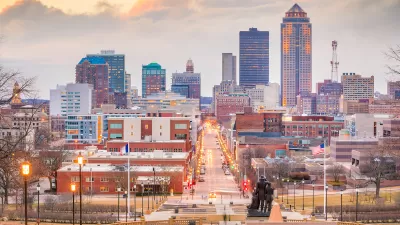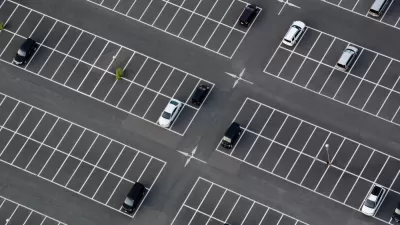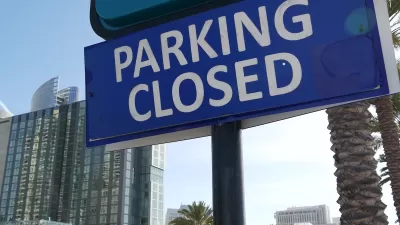It's unclear who exactly is behind the Philly Parking Wasteland website, but it is clear that the site exists to excoriate the mismanagement of land for the purposes of parking around the city of Philadelphia.
The Philly Parking Wasteland launched in December 2014, and so far consists of three posts a month on a different variety of parking malfeasance, as described by the post.
So for a post dated on February 15, the site goes into detail about the enforcement and policy challenges that have led some neighborhoods in South Philly, like on Washington Avenue along Broad Street, to adopt the practice of parking cars in the middle of the street. The site blames lack of enforcement by Philadelphia police, lax parking permits standards and fees, and a lack of street cleaning schedules as the cause of the de facto parking policy.
There is also a post from February 21 that tackles the 2.5-acre parking lot that serves the the Mid-Atlantic Social Security. The problem is that the surface parking lot sits adjacent to the Spring Garden Station for the city's elevated train line, and creates a "dead-zone" between the "vibrant Old City and Northern Liberties neighborhoods."
That latter post also provides insight into the site's modus operandi of critiquing specific instances of parking wastelands:
'Far too much cheap or free parking creates less people engaged in the fate of the transit system and whole swaths of middle class types who are encouraged to move out of the city all together. Blaming all these woes on a single parking lot is not out of order. It is rather a very clear look at a negative cycle. The simple choices presented to people have huge consequences on the greater health of the city. Why does the Spring Garden station look rundown and under-appreciated? A good place to start would be considering the hundreds of people who drove past it today on the way to work.'
FULL STORY: Philly Parking Wasteland

Alabama: Trump Terminates Settlements for Black Communities Harmed By Raw Sewage
Trump deemed the landmark civil rights agreement “illegal DEI and environmental justice policy.”

Planetizen Federal Action Tracker
A weekly monitor of how Trump’s orders and actions are impacting planners and planning in America.

Why Should We Subsidize Public Transportation?
Many public transit agencies face financial stress due to rising costs, declining fare revenue, and declining subsidies. Transit advocates must provide a strong business case for increasing public transit funding.

Understanding Road Diets
An explainer from Momentum highlights the advantages of reducing vehicle lanes in favor of more bike, transit, and pedestrian infrastructure.

New California Law Regulates Warehouse Pollution
A new law tightens building and emissions regulations for large distribution warehouses to mitigate air pollution and traffic in surrounding communities.

Phoenix Announces Opening Date for Light Rail Extension
The South Central extension will connect South Phoenix to downtown and other major hubs starting on June 7.
Urban Design for Planners 1: Software Tools
This six-course series explores essential urban design concepts using open source software and equips planners with the tools they need to participate fully in the urban design process.
Planning for Universal Design
Learn the tools for implementing Universal Design in planning regulations.
Caltrans
Smith Gee Studio
Institute for Housing and Urban Development Studies (IHS)
City of Grandview
Harvard GSD Executive Education
Toledo-Lucas County Plan Commissions
Salt Lake City
NYU Wagner Graduate School of Public Service





























